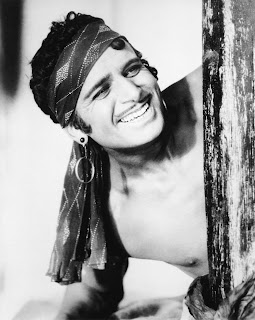 He was called "The King of Hollywood" and if any actor during the Silent Era might credibly have claimed to be more popular than Charlie Chaplin, it was Elton Thomas Ullman, better known to his adoring public as Douglas Fairbanks.
He was called "The King of Hollywood" and if any actor during the Silent Era might credibly have claimed to be more popular than Charlie Chaplin, it was Elton Thomas Ullman, better known to his adoring public as Douglas Fairbanks.The star of forty-eight movies, including some of the greatest action films of all time, he was, along with Chaplin and his wife Mary Pickford, one of the three highest-paid and most-popular actors of his day. On his honeymoon with Pickford, Fairbanks and his bride drew crowds of 300,000 in Paris and London. At home in their mansion, dubbed "Pickfair," the two threw lavish parties and routinely entertained the world's most sought-after celebrities. To receive an invitation to Pickfair was to receive the social blessing of Hollywood royalty.
But Fairbanks was more than just a regular feature of the gossip columns and party circuit. He was also a fine actor and virtually created the modern action hero in a series of swashbuckling adventures that showcased an infectious joie de vivre and an extraordinary flare for stuntwork.
His lead performance in The Mark of Zorro, for which I awarded him a Katie as best actor of 1920, was his first foray into the genre of the period-costume action-adventure. Already a star of comedies, audiences responded with such enthusiasm to Fairbanks's new role that he cheerfully ended up playing variations on it for the rest of his career.
 The per- formance was both ground- breaking and one of the most influential in movie history, esta- blishing many of the superhero and action hero conventions we now take for granted. His physique later served as the model for the comic hero Superman and the mask, secret hideaway and foppish alter ego inspired the creators of Batman.
The per- formance was both ground- breaking and one of the most influential in movie history, esta- blishing many of the superhero and action hero conventions we now take for granted. His physique later served as the model for the comic hero Superman and the mask, secret hideaway and foppish alter ego inspired the creators of Batman.As a co-founder of United Artists, Fairbanks had complete creative control over his pictures and he produced a string of action-adventure classics—The Mark of Zorro, The Three Musketeers, Robin Hood, The Thief of Bagdad, Don Q Son of Zorro, The Black Pirate, The Gaucho—before saying farewell to the genre with The Iron Mask. On each of these movies, he worked not just as an actor but also as a writer (under the name Elton Thomas) and a producer.
The Thief of Bagdad was the best of these movies, one of the finest of its type ever made. Loosely based on stories from One Thousand and One Nights, The Thief of Bagdad is the tale of a pickpocket who falls in love with a princess and who then sets off on a fantastic adventure to prove himself. With the graceful and athletic Fairbanks at its heart, The Thief of Bagdad is as fluid as a ballet while at the same time serving up a rip-snorting yarn filled with the best special effects 1924 could offer.
 I selected it as the best picture of 1924 over such classics as Greed, The Last Laugh, The Navigator and Sherlock, Jr. and feel completely justified in doing so. The American Film Institute voted The Thief of Bagdad the ninth best fantasy movie of all time, the only silent film on the list, and along with City Lights, one of only two silent movies on any of the AFI Top Ten lists. In my opinion, it was the best fantasy movie made before The Wizard of Oz in 1939, and was probably the best action-adventure movie before 1938's The Adventures of Robin Hood.
I selected it as the best picture of 1924 over such classics as Greed, The Last Laugh, The Navigator and Sherlock, Jr. and feel completely justified in doing so. The American Film Institute voted The Thief of Bagdad the ninth best fantasy movie of all time, the only silent film on the list, and along with City Lights, one of only two silent movies on any of the AFI Top Ten lists. In my opinion, it was the best fantasy movie made before The Wizard of Oz in 1939, and was probably the best action-adventure movie before 1938's The Adventures of Robin Hood.Fairbanks continued making swashbuckling adventures until the dawn of the Early Sound Era when he put down his foil and returned to the genre that had given him his start, comedy. He made four movies, including one, The Taming of the Shrew, with his by-then estranged wife, Mary Pickford, then retired from acting altogether.
He later received a commemorative Oscar in recognition of his work as the first president of the Academy of Motion Picture Arts and Sciences and his "outstanding contribution ... to the international development of the motion picture."
Douglas Fairbanks died of a heart attack in 1939 at the age of fifty-five. His last words were "Never felt better."